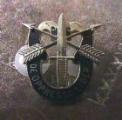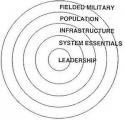Early History
Civil Military Operations (CMO) conducted by the U.S. Military go back at least to the American War for Independence. During that conflict, all sides employed civil affairs in every colony/state. Military authorities managed activities that civilians had managed prior to the war. The occupation of Canada was an early example of "how-not-to-do-it", as Patriots were pitted against Tories in 1775 by the first U.S. occupational military government in Montreal.
In the U.S.-Mexican War, Lt. Gen. Winfield Scott could be considered the "Father of Civil Affairs." He displayed a deep respect for the Mexican people and their culture. Scott enjoyed great success in keeping civilian problems from interfering with military operations by issuing General Order No. 20 and ensuring the Provost Marshals office enforced it. The United States Army considers this to be where Civil Affairs (CA) originated.
At the end of the 19th century, and well into the 20th U.S. Army was involved in numerous military interventions in several of the Caribbean and Latin American nations before and after World War I. After the Spanish-American War ended in 1898, Maj. Gen. Leonard Wood restored order in Cuba with CA forces. The Army returned to Cuba in 1905, again in 1912, and starting in 1917, was there for a period of fien years. It was again called upon to protect American interests by military intervention in the Dominican Republic (1916 – 1924), Haiti (1915 – 1934), and Nicaragua (1926–1934). The Army was also called to Panama in 1903 to ensure the birth of that nation when it broke away from Colombia to become independent. According to the John F. Kennedy Special Warfare Center & School located at Fort Bragg, North Carolina, at worst, the CMO performance was highhanded and overbearing, while at best, the Army restored more stable economic and political situations in those areas.
Showing "Uncle Sam with a schoolbook in one hand and a Krag rifle in the other" best summarized the civil-military policy in the Philippines, which was also acquired by the United States as a result of the Spanish-American War. While Cuba became independent in 1902, the Philippines was granted the status of a territory, with the promise of independence. They became independent after the Second World War in 1946. The payoff of an enlightened military government policy was the Filipinos were the only Pacific colonized peoples to resist the Japanese on any scale.






 .
.



 If I can answer this question satisfactorily, I'm putting in for an instant promotion.
If I can answer this question satisfactorily, I'm putting in for an instant promotion.










Bookmarks